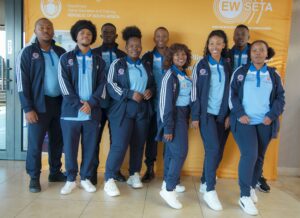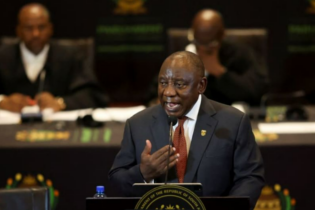The role of Technical Vocational Education and Training (TVET) Colleges in South Africa’s Just Energy Transition will be strengthened by an innovative partnership led by the Energy and Water Sector Education and Training Authority (EWSETA) and the Chinese Culture and International Education Exchange Centre (CCIEEC).
“This programme not only seeks to establish a comprehensive renewable energy education and industry system in the country’s TVET colleges but also to enhance the international standards of South African TVET colleges over the next five to ten years,” comments Mpho Mookapele, CEO of EWSETA. At the launch function held on 31 May 2024, the programme partners bade farewell to 54 learners and six lecturers from TVET colleges who will travel to China for a year-long experiential learning programme. The learners who will be trained in the field of solar PV manufacturing are from the following TVET colleges; Elangeni TVET College (KZN), Vhembe TVET College (Limpopo), Ingwe College (Eastern Cape), South West Gauteng and Westcol TVET Colleges in Gauteng, as well as Northern Cape Rural TVET (Northern Cape). In April 2024, the SETA Integrated High Impact Programme (SIHIP) was launched at the SETA Skills Conference which outlines a series of initiatives to be undertaken by SETAs to drive collaboration and cooperation among SETAs. This is essential to maximise the impact and effectiveness of SETA programmes towards national development goals. The Just Energy Transition Learner and Lecturer Development Support Programme talks directly to the aims of the SIHIP in that EWSETA is partnering with the Construction Education and Training Authority (CETA) and the Food and Beverage Manufacturing SETA (FoodBev SETA) on this programme, enabling the programme to be scaled up from an initial four TVET Colleges to the participation of six TVET Colleges EWSETA’s involvement with the CCIEEC offers numerous benefits. Through the provision of high-quality trainers, curriculum development, exchange programmes, research and involvement by Chinese companies, as well as funding streams, the partnership will directly benefit not just the learners and lecturers involved, but South Africa’s critical power supply issues and the country’s national imperatives of economic recovery and skills development.From a long-term sustainability perspective, the development of renewable energy production lines within the TVET Colleges, where the manufacturing of solar panels, inverters and lithium batteries will be done locally, will ensure added revenue streams for the identified TVET Colleges and global competitiveness of South Africa in a market dominated by China.
These production lines will not only grow our TVET College capacity but through affording learners practical workplace opportunities, the quality of renewable energy skills coming out of these TVET Colleges will be world-class. The programme will leverage Chinese experience and technology in education; enhance the quality of South African TVET education through international collaboration; integrate educational programmes with industry needs and provide students with practical skills and real-world experience. From a skills development perspective, the programme will address critical skill shortages in renewable energy and other sectors, as well as prepare students and educators for emerging technologies and industries. Commenting on the benefits of international cooperation because of this programme, Dr Zhilei Lu, General Manager at the CCIEEC, says, “This innovative collaboration will strengthen educational ties between South Africa and China, and facilitate cultural exchange and mutual understanding between our two countries.” “As South Africa continues to seek solutions to its ongoing energy crisis, EWSETA embraces this type of partnership because of the value it brings to our mandate of capacitating the energy sector with the skills it requires,” concludes Mookapele.






